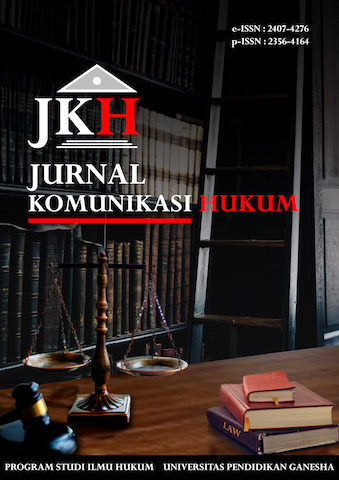EFEKTIVITAS DINAS LINGKUNGAN HIDUP DALAM MENGELOLA SAMPAH SEBAGAI UPAYA PERLINDUNGAN TERHADAP LINGKUNGAN
DOI:
https://doi.org/10.23887/jkh.v8i2.48856Abstract
The goal of this research was to know how effectiveness of trash management based on legislation adopted by the South Tangerang City Environmental Service. The author uses empirical legal methods, using a descriptive qualitative approach. Primary data were gained through conducting field interviews, while secondary data was gathered through a literature review. Considering the study's findings, The South Tangerang City Environmental Service manages garbage in accordance with all applicable relevant laws and regulations, namely Constitution Number 18 of 2018 concerning Garbage Management, South Tangerang City Regional Regulation Number 13 of 2019 concerning Change On Regional Regulation Number 3 of 2013 concerning Trash Management, and Regulation Mayor South Tangerang Number 50 of 2017 concerning Trash Management. However, it is not fully successful in its implementation since the garbage dump is not located in line with the provisions of the garbage dump determination, resulting in environmental contamination in the area surrounding the garbage dump. The inadequate location of the landfill, the residents' lack of awareness of the value of participation in waste management, and limited waste management infrastructure are among the challenges faced by the Environmental Service of South Tangerang City in implementing waste management.
Downloads
Published
How to Cite
Issue
Section
License
Authors who publish with this journal agree to the following terms:- Authors retain copyright and grant the journal right of first publication with the work simultaneously licensed under a Creative Commons Attribution License that allows others to share the work with an acknowledgement of the work's authorship and initial publication in this journal.
- Authors are able to enter into separate, additional contractual arrangements for the non-exclusive distribution of the journal's published version of the work (e.g., post it to an institutional repository or publish it in a book), with an acknowledgement of its initial publication in this journal.
- Authors are permitted and encouraged to post their work online (e.g., in institutional repositories or on their website) prior to and during the submission process, as it can lead to productive exchanges, as well as earlier and greater citation of published work (See The Effect of Open Access).
Authors who publish with this journal agree to the following terms:
- Authors retain copyright and grant the journal right of first publication, with the work [SPECIFY PERIOD OF TIME] after publication simultaneously licensed under aCreative Commons Attribution License that allows others to share the work with an acknowledgement of the work's authorship and initial publication in this journal.
- Authors are able to enter into separate, additional contractual arrangements for the non-exclusive distribution of the journal's published version of the work (e.g., post it to an institutional repository or publish it in a book), with an acknowledgement of its initial publication in this journal.
- Authors are permitted and encouraged to post their work online (e.g., in institutional repositories or on their website) prior to and during the submission process, as it can lead to productive exchanges, as well as earlier and greater citation of published work (See The Effect of Open Access).












